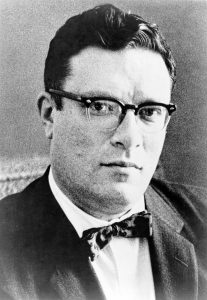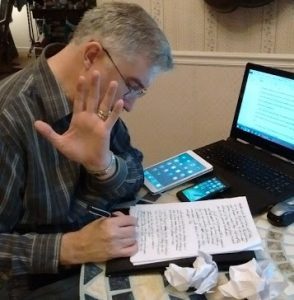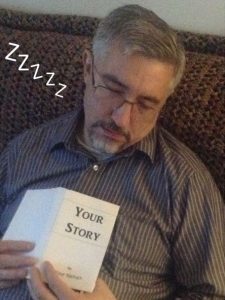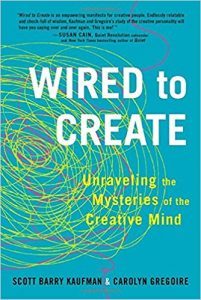Steven R. Southard's Blog, page 47
February 4, 2018
Fiction Writing: Not Your Normal Day Job
If you work at a typical desk job and want to write fiction at night, be prepared. The two occupations are not at all alike. But what if your day job suddenly got altered to be more like fiction writing? Let’s find out what that would be like.
You wake up at whatever time you like; you’re now setting your own hours. There’s no commute. You telework every day. No one sees you working, or checks on your progress. There are no meetings, no boring chats by the coffee machine, and no lunches with...
January 28, 2018
Dissing the Dys-Dys
After reading Henry Farrell’s essay “Philip K. Dick and the Fake Humans” in the Boston Review, I felt compelled to comment.
Farrell’s essay is fascinating and well written, if somewhat unfocused. He begins by stating that literary dystopias suffer from a flaw in that all their mechanisms for controlling people are 100% functional. The devices used by dictators to keep people down always work. A more realistic depiction of a dystopia would include breakdowns, bugs, faults, etc.
He cites, for e...
January 21, 2018
Your Author Photo
These days, if you’re going to be an author, you need an author photo. When you get yours taken, it needs to be better than mine in several ways.
First, why do you need an author photo? Maybe you’d prefer not to have one, believing your image will turn readers away. If so, ask yourself if you’ve ever refused to buy a book because of the picture of the author. Nobody does that. For the real people who will buy your book, it’s comforting for them to see what kind of real person wrote it.
January 14, 2018
Writing with Spectators
In his book The Way the Future Was, the late science fiction author Frederik Pohl stated, “Writing is not a spectator sport.” Oh, yeah? I set out to prove him wrong.
I rented a football stadium, hired two commentators, and advertised for several thousand of my fans to watch me write. Here’s the transcript, as broadcast:
 Pat: “It’s a beautiful afternoon here at the stadium and we’ve got quite a crowd for this amazing event. Wouldn’t you say so, John?”
Pat: “It’s a beautiful afternoon here at the stadium and we’ve got quite a crowd for this amazing event. Wouldn’t you say so, John?”
John: “No doubt about that, Pat, weather-w...
January 7, 2018
Writing Aloud
Most writers type the first drafts of their stories. A few, like me, hand-write their first drafts. Perhaps you’d like to try a third way…dictating your stories.
That’s right. Forget the keyboard or pen. Just speak your story into a recording device.
Reasons
Why might you want to do that? On her site, Cindy Grigg offers 13 compelling reasons. I was struck by the first one, speed. After getting used to dictating stories, many writers find they can crank out their first draft prose much faster....
January 2, 2018
22 Ways to Celebrate Science Fiction Day
Today is National Science Fiction Day. Wait…National SF Day? Since no nation officially recognizes it, I suggest we rename it Galactic Science Fiction Day. After all, the Milky Way Galaxy has officially recognized it. Don’t believe me? Prove me wrong.

Dr. Isaac Asimov
January 2 is an apt date for SF Day. It’s Isaac Asimov’s birthday. Maybe. I seem to recall reading that Isaac wasn’t 100% sure of his birthdate. That ambiguity makes the date even more fitting.
Also, January 2 is so close to the...
December 31, 2017
Orwell or Wells—Can Science Save Humanity?
Will Science save humankind, or lead us to our doom? The Internet is buzzing lately with various online outlets reprinting this article by Richard Gunderman in The Conversation, about a debate between H. G. Wells and George Orwell on this topic.
 H.G. Wells, best known for his science fiction novels such as The War of the Worlds and The Time Machine, believed science was the best hope for humanity’s future. George Orwell, an essayist, critic, and author of 1984 and Animal Farm, took a less opt...
H.G. Wells, best known for his science fiction novels such as The War of the Worlds and The Time Machine, believed science was the best hope for humanity’s future. George Orwell, an essayist, critic, and author of 1984 and Animal Farm, took a less opt...
December 24, 2017
Defeating Distraction, Finding Focus
You’re writing at a good pace, but then get distracted, torn away from your story. You hate when that happens, but sometimes the diversion is irresistible. What causes that, and how can you prevent it?
 We live in a distraction-rich environment. Even before the Internet, there were rooms to clean, library books to return, lawns to mow, desk items to straighten, and windows to gaze through. Today, there are Facebook posts to like, tweets to retweet, texts to answer, online stores to shop in, bl...
We live in a distraction-rich environment. Even before the Internet, there were rooms to clean, library books to return, lawns to mow, desk items to straighten, and windows to gaze through. Today, there are Facebook posts to like, tweets to retweet, texts to answer, online stores to shop in, bl...
December 17, 2017
4 Ways to Fix the Boring Parts
Alfred Hitchcock once said, “Drama is life with the dull parts cut out of it.” Is that the secret to good fiction writing? Can it be that simple?
 Let’s say you’re looking over the story you just finished writing and you see a section where the action really drags. While writing, it seemed necessary to describe a scene fully or explain a character’s backstory so later plot actions would make sense. Now you’re torn. Should you follow Hitchcock’s advice and just cut that section, or leave it in...
Let’s say you’re looking over the story you just finished writing and you see a section where the action really drags. While writing, it seemed necessary to describe a scene fully or explain a character’s backstory so later plot actions would make sense. Now you’re torn. Should you follow Hitchcock’s advice and just cut that section, or leave it in...
December 10, 2017
Improving Your Creativity, Habit by Habit
Each of us is born creative. Some lose their creativity along the way. If you’d like to write fiction, but don’t think you’re creative enough, I believe you can increase that attribute through effort.
 Researchers Carolyn Gregoire and Dr. Scott Barry Kaufman developed a list of habits practiced by creative people. In their book, Wired to Create: Unravelling the Mysteries of the Creative Mind, Gregoire and Kaufman introduce and discuss those habits.
Researchers Carolyn Gregoire and Dr. Scott Barry Kaufman developed a list of habits practiced by creative people. In their book, Wired to Create: Unravelling the Mysteries of the Creative Mind, Gregoire and Kaufman introduce and discuss those habits.
However, if you’re trying to improve by pract...



